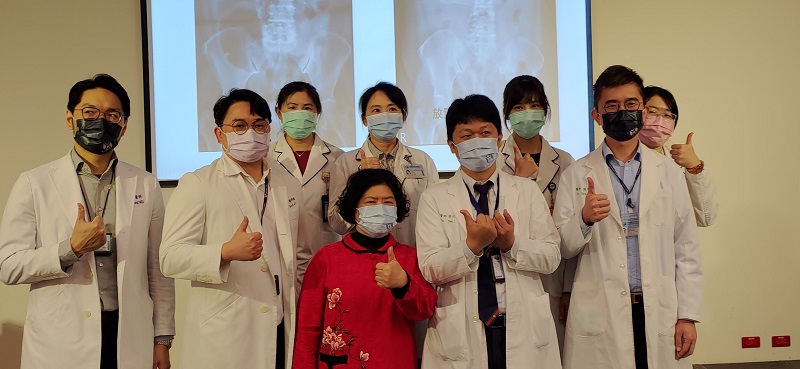News and Award
About CMUH
Middle-aged office workers with “poor appetite, difficult elimination” found to suffer from bowel obstruction due to colon cancer Colon cancer patients with bowel obstruction are lucky to be saved by magic metal stents
Middle-aged office workers with “poor appetite, difficult elimination” found to suffer from bowel obstruction due to colon cancer
Colon cancer patients with bowel obstruction are lucky to be saved by magic metal stents
“Once the patients’ bowels became obstructed, their lives went into chaos.”
As Ms. Lai was aware of her colon cancer diagnosis, she not only needed to take care of herself but also worried about her work routine being influenced by the hospitalization period and her suddenly required surgical operation. After discussing this with the medical team, she decided to have metal stents placed at the site of the obstruction in the colon to expand the bowel so it could be passed through again. The next day after the metal stents were placed, she could eliminate stool, pass gas, and eat normally right away. After being discharged from the hospital and going home, she returned to the hospital about two weeks later for minimally invasive laparoscopic tumor removal surgery; so far, she is quite stable and follows up regularly.
Among the OPD patients visiting Dr. Yuan-Yao Tsai, Colorectal Surgery Division, Department of Surgery at China Medical University Hospital, most bowel obstructions suffered by colon cancer patients involve senior patients. When treating elderly people, more aspects and treatment strategies need to be considered carefully.
Dr. Yuan-Yao Tsai explained that, clinically, bowel obstruction is usually caused by colon tumors. When tumors invade the bowel muscle layers, the gut loses elasticity. Along with growing and enlarged tumors, the bowel may be obstructed or become inflamed and swollen, which results in poor appetite, feeling distended after meals, feeling constipated, weight loss, and other symptoms.

“Once metal stents are placed, the bowel can be passed through immediately”
In the past, bowel obstruction patients usually needed to have the intervention of a temporary colostomy (artificial anus), in which the physician cut the obstructed part of the bowel, then sutured the colostomy onto the surface of the abdomen. After the patients’ nutritional conditions recovered and the swelling of the bowel subsided, the tumor removal operation could be implemented. The patients would require general anesthesia and the overall hospitalization period would be longer; furthermore, the cleaning and care of the colostomy must be done carefully to avoid any infection.
Today, the patient can choose to have bowel metal stents to quickly relieve the issue of bowel obstruction and return to their normal lives.
Dr. Yuan-Yao Tsai indicated that most patients are under higher risks of surgical complications due to their poor nutritional conditions caused by bowel obstructions even before being sent to the ER. If they can have bowel metal stents placed beforehand, their hospitalization and recovery periods will be shortened significantly. Once the stents are placed, patients can eat right away and recover their nutrition intake. Afterwards, minimally invasive laparoscopic surgery can be arranged to remove the tumors, and all the postoperative complications or infection risks will be significantly reduced. For elderly patients aged 70 years old and above, with chronic illness like heart failure or renal impairment issues, this intervention is optimal for them.
“Bowel metal stents approved for reimbursement under National Health Insurance”
Last December (2021), for those colon cancer patients with bowel obstruction who could not undergo surgical operations and their tumors were located more than 5 cm from the opening of the anus, bowel metal stents have been approved for reimbursement . Dr. Yuan-Yao Tsai reminds patients that treatment for colon cancer covers many details, and multiple factors need to be considered so patients need to communicate with their physicians completely to choose the optimal treatment strategies and properly control treatment risks.
“Disease knowledge tips”
About "bowel obstruction" Bowel obstruction refers to an obstruction in the bowel induced by the compression or obstruction of the tumor in the abdomen, which leads to the patient not being able to eliminate stools normally. The common symptoms are abdominal pain, distention, vomiting, and inability to eliminate stool or pass gas. Severe complications may occur, including bowel perforation, peritonitis, and sepsis.



![[Taiwan–Malaysia Medical Innovation Forum] CMUH and UNIMAS Co-Host Major Medical Symposium to Advance Medical Technology and Precision Patient Care img](/FileUploads/News/20250714_131324.jpg?w=250&h=180&mode=crop&scale=both)